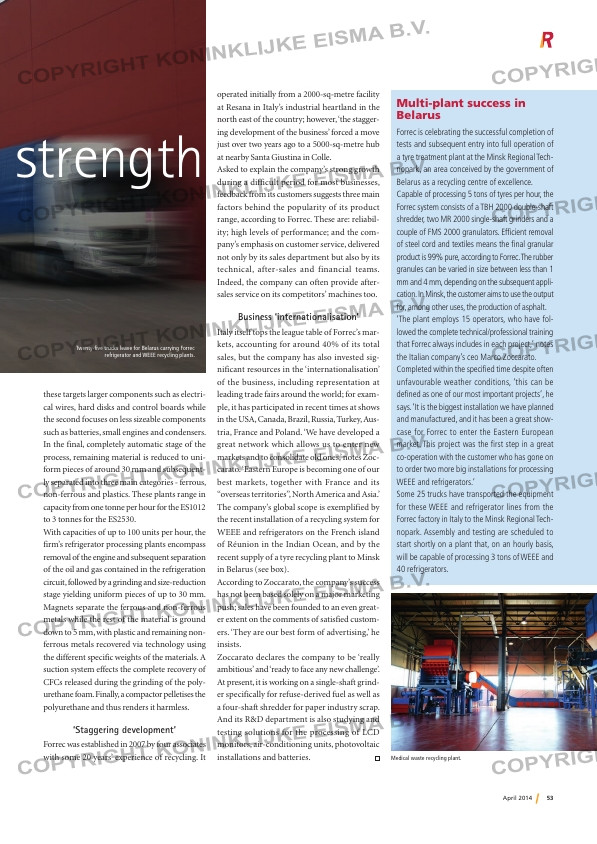Page 53 from: April 2014

53April 2014
these targets larger components such as electri-
cal wires, hard disks and control boards while
the second focuses on less sizeable components
such as batteries, small engines and condensers.
In the final, completely automatic stage of the
process, remaining material is reduced to uni-
form pieces of around 30 mm and subsequent-
ly separated into three main categories – ferrous,
non-ferrous and plastics. These plants range in
capacity from one tonne per hour for the ES1012
to 3 tonnes for the ES2530.
With capacities of up to 100 units per hour, the
firm’s refrigerator processing plants encompass
removal of the engine and subsequent separation
of the oil and gas contained in the refrigeration
circuit, followed by a grinding and size-reduction
stage yielding uniform pieces of up to 30 mm.
Magnets separate the ferrous and non-ferrous
metals while the rest of the material is ground
down to 5 mm, with plastic and remaining non-
ferrous metals recovered via technology using
the different specific weights of the materials. A
suction system effects the complete recovery of
CFCs released during the grinding of the poly-
urethane foam. Finally, a compactor pelletises the
polyurethane and thus renders it harmless.
‘Staggering development’
Forrec was established in 2007 by four associates
with some 20 years’ experience of recycling. It
operated initially from a 2000-sq-metre facility
at Resana in Italy’s industrial heartland in the
north east of the country; however, ‘the stagger-
ing development of the business’ forced a move
just over two years ago to a 5000-sq-metre hub
at nearby Santa Giustina in Colle.
Asked to explain the company’s strong growth
during a difficult period for most businesses,
feedback from its customers suggests three main
factors behind the popularity of its product
range, according to Forrec. These are: reliabil-
ity; high levels of performance; and the com-
pany’s emphasis on customer service, delivered
not only by its sales department but also by its
technical, after-sales and financial teams.
Indeed, the company can often provide after-
sales service on its competitors’ machines too.
Business ‘internationalisation’
Italy itself tops the league table of Forrec’s mar-
kets, accounting for around 40% of its total
sales, but the company has also invested sig-
nificant resources in the ‘internationalisation’
of the business, including representation at
leading trade fairs around the world; for exam-
ple, it has participated in recent times at shows
in the USA, Canada, Brazil, Russia, Turkey, Aus-
tria, France and Poland. ‘We have developed a
great network which allows us to enter new
markets and to consolidate old ones,’ notes Zoc-
carato. ‘Eastern Europe is becoming one of our
best markets, together with France and its
“overseas territories”, North America and Asia.’
The company’s global scope is exemplified by
the recent installation of a recycling system for
WEEE and refrigerators on the French island
of Réunion in the Indian Ocean, and by the
recent supply of a tyre recycling plant to Minsk
in Belarus (see box).
According to Zoccarato, the company’s success
has not been based solely on a major marketing
push; sales have been founded to an even great-
er extent on the comments of satisfied custom-
ers. ‘They are our best form of advertising,’ he
insists.
Zoccarato declares the company to be ‘really
ambitious’ and ‘ready to face any new challenge’.
At present, it is working on a single-shaft grind-
er specifically for refuse-derived fuel as well as
a four-shaft shredder for paper industry scrap.
And its R&D department is also studying and
testing solutions for the processing of LCD
monitors, air-conditioning units, photovoltaic
installations and batteries.
Multi-plant success in
Belarus
Forrec is celebrating the successful completion of
tests and subsequent entry into full operation of
a tyre treatment plant at the Minsk Regional Tech-
nopark, an area conceived by the government of
Belarus as a recycling centre of excellence.
Capable of processing 5 tons of tyres per hour, the
Forrec system consists of a TBH 2000 double-shaft
shredder, two MR 2000 single-shaft grinders and a
couple of FMS 2000 granulators. Efficient removal
of steel cord and textiles means the final granular
product is 99% pure, according to Forrec. The rubber
granules can be varied in size between less than 1
mm and 4 mm, depending on the subsequent appli-
cation. In Minsk, the customer aims to use the output
for, among other uses, the production of asphalt.
‘The plant employs 15 operators, who have fol-
lowed the complete technical/professional training
that Forrec always includes in each project,’ notes
the Italian company’s ceo Marco Zoccarato.
Completed within the specified time despite often
unfavourable weather conditions, ‘this can be
defined as one of our most important projects’, he
says. ‘It is the biggest installation we have planned
and manufactured, and it has been a great show-
case for Forrec to enter the Eastern European
market. This project was the first step in a great
co-operation with the customer who has gone on
to order two more big installations for processing
WEEE and refrigerators.’
Some 25 trucks have transported the equipment
for these WEEE and refrigerator lines from the
Forrec factory in Italy to the Minsk Regional Tech-
nopark. Assembly and testing are scheduled to
start shortly on a plant that, on an hourly basis,
will be capable of processing 3 tons of WEEE and
40 refrigerators.
Going from strength to strength
Medical waste recycling plant.
Twenty-five trucks leave for Belarus carrying Forrec
refrigerator and WEEE recycling plants.
R -3- 014- in .indd 3 0 -04-14 1 :



